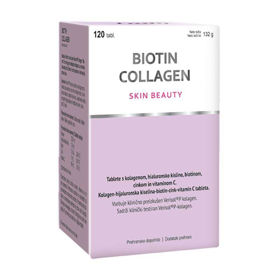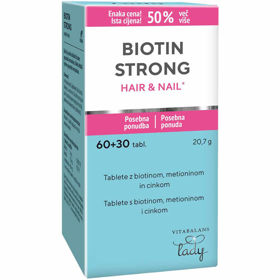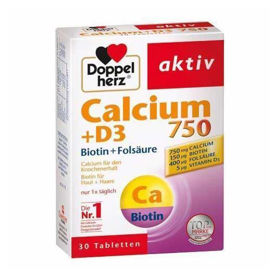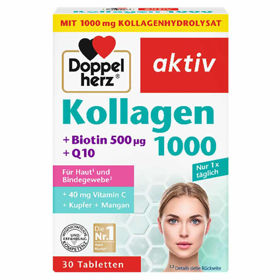Customer question:
What problems can biotin supplementation help with? Anonymous customer's question
Pharmacist's answer:
Biotin, also known as vitamin B7, is a water-soluble vitamin necessary for many metabolic processes in the human body. The most common reason to supplement with biotin is to promote hair growth and reduce hair loss. People experiencing hair loss often take biotin supplements to increase the thickness of their nails and prevent them from chipping, splitting, or breaking.
Some believe supplementing with biotin can help combat certain skin conditions, such as redness and scaly rashes. Still, it's worth noting that these skin conditions are often symptoms of biotin deficiency so a dietary supplement would be most beneficial for those deficient in this vital vitamin. Although rare, some people are deficient in biotin due to genetic disorders, long-term use of certain medications, or excessive consumption of raw egg whites, which contain a protein that prevents biotin absorption.
Biotin needs usually increase during pregnancy and breastfeeding. Although serious deficiencies are rare, some pregnant and lactating women may take biotin supplements to ensure they are meeting their increased needs. In conclusion, while there are many reasons why people choose biotin supplements, it is always crucial to consult a doctor before starting any new supplement.
Can a biotin supplement contribute to more beautiful and stronger hair?
Biotin is often associated with hair health. Many beauty supplements market biotin as a supplement for hair problems, touting its benefits for enhancing the beauty and strength of hair. One of the main lines of evidence linking biotin to hair health comes from observing people with biotin deficiency. Symptoms of biotin deficiency often include thinning or hair loss. By correcting this deficiency with the addition of biotin, these symptoms can be reversed.
However, it is essential to note that true biotin deficiency is rare.
What should we pay attention to when choosing a dietary supplement with biotin?
Here are some key factors to consider:
- Dosage: ensure that the supplement provides the appropriate amount of biotin. While biotin toxicity is rare because it is water soluble and excess is excreted in the urine, it is still important not to consume excessive amounts.
- Purity and quality: choose a brand that undergoes third-party testing to ensure the product is free of contaminants and contains the amount of biotin listed on the label.
- Other ingredients: check the label for other added ingredients. Some supplements may contain fillers, binders, dyes, or allergens that could be problematic for some individuals.
- Biotin source: Although most biotin supplements are synthesized and not derived directly from natural foods, if you have particular dietary concerns (such as vegan or vegetarian needs), make sure the product is compatible.
- Certifications: look for quality seals or certifications from reputable organizations.

- Form: supplements come in various forms, including capsules, tablets, soft gels, powders, and gums. Choose the format that suits you and aligns with any dietary restrictions or wishes.
- Drug Interactions: biotin can potentially interact with certain medications and medical devices. For example, biotin can interfere with some laboratory tests.
- Brand reputation: consider buying from established brands with a solid reputation in the market. Reading reviews and looking for recommendations can help you.
You can view our range of biotin supplements at the link below:
https://www.moja-lekarna.com/iskanje?q=biotin
What are the symptoms of biotin deficiency in the body?
Biotin is crucial for various metabolic processes in the body. Although biotin deficiency is rare, it can cause several symptoms. These symptoms can vary from mild to severe and affect the skin, hair, nails, and nervous system.
Here are the main symptoms of biotin deficiency:
- Hair loss: one of the most well-known symptoms after lack of biotin is hair loss - often, alopecia can also be associated with this. In some cases, hair loss can be widespread, while in others, it can appear as thinning hair in certain areas.
- Dermatological symptoms: red, scaly, and sometimes itchy rashes may appear, especially around the eyes, nose, mouth, and genitals. Individuals may experience unusually dry or scaly skin. Babies, in particular, may experience a special type of skin inflammation that results in scaly patches and redness.
- Brittle nails: Nails can become brittle, leading to increased breaking or splitting.
- Neurological symptoms: biotin plays an important role in the functioning of the nerves, and a deficiency can cause neurological disorders, such as constant tiredness, numbness and tingling, depression, and muscle pain and spasms.< /li>
- Conjunctivitis: inflammation of the membrane that covers the white part of the eye and the inside of the eyelids can occur.
- Increased susceptibility to infections: biotin is involved in the functioning of the immune system, and a deficiency can lead to a weakened immune response, making the individual more susceptible to infections.
- Developmental delays in infants: In severe cases, especially when infants are deficient in biotin, developmental delays or other abnormal neurological symptoms may occur.
- Aciduria: elevated levels of certain acids in the urine, a condition called organic aciduria, can occur with severe biotin deficiency.
Can biotin help against hair loss?
Biotin, often associated with hair health, has been identified as a potential anti-hair loss supplement. Biotin is a coenzyme that participates in the synthesis of keratin, the protein that makes up hair. Given its essential role in keratin production, there is a theoretical basis for its importance to hair health. The link between biotin and hair health comes from observations in people with biotin deficiency, as thinning or hair loss is one of the deficiency symptoms. By correcting this deficiency with biotin supplementation, these symptoms can be reversed.
On the plus side, biotin is water soluble, meaning that excess amounts are usually excreted in the urine, making the risk of toxicity low. However, high doses of biotin can interfere with some medical tests, leading to potentially inaccurate results.
While biotin plays an essential role in hair health and supplements can help those deficient, its effectiveness in preventing or treating hair loss in individuals with adequate biotin levels is still debated. If you are considering biotin supplements for hair loss or any other reason, it is recommended that you also consult a dermatologist or doctor.
Interesting reading: Biotin for dogs













